Black Boxer Dog Feeding Guide
Examine the unique dietary needs of black Boxer dogs to make sure they keep their robust build and energetic personality. Discover how to feed your black Boxer the best possible food to improve their general health and well-being. Learn how to sustain your black Boxer dog’s endless energy and vigor by meeting their unique nutritional demands.
What’s the Right Amount of Food for Black Boxer Dog
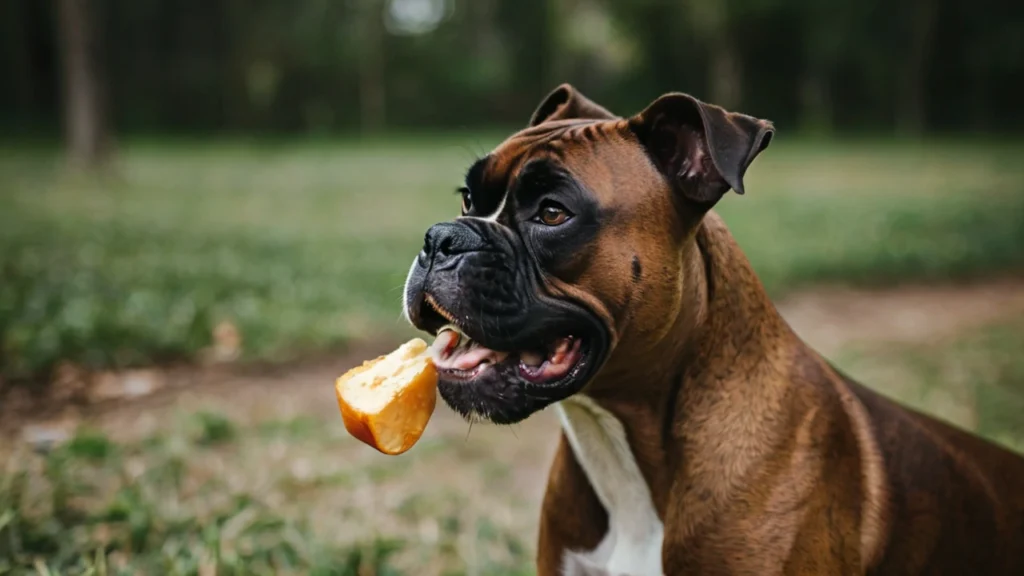
- It’s critical to determine how much food your black Boxer should be eating for their overall health and wellbeing. Realizing that their food requirements are influenced by variables like as age, size, and activity level.
- According to guidelines, mature Boxers do best when fed 2.5 to 3 cups of dry food each day, divided into two meals. For a happy, healthy companion, watch their health and energy levels and modify portions appropriately.
Growing pup to 2 year mark
- Early establishment of a regular feeding routine is essential for a well-mannered Boxer. Between the ages of one and two, Boxers may go through a “skinny phase” throughout the growth period.
- Choosing to eat three meals a day in addition to snacks may assist in meeting their energy and development demands.
Adults 2 years and up
- When your Boxer reaches maturity, two meals a day plus snacks usually cover it. Some people may survive on one major meal if they consume substantial and frequent snacks, but be aware of the warning signals of fast eating caused by hunger, which can result in bloating.
- Use a stainless-steel slow-feed dish, such as Mr. Peanut’s Stainless Steel Slow Feed dish, to control their feeding speed and encourage a healthy digestive system to avoid this.
What Diet Is Suitable for Black Boxer Dog
- You may tailor a customized diet to your Boxer’s specific needs, but careful preparation is necessary to ensure optimal nutritional balance.
- To protect your Boxer’s health, consult a veterinarian or a canine nutritionist before starting this food trip.
How Much Should You Feed an Adult
- The right quantity to feed your Boxer depends on a number of characteristics, including size, age, and activity level. Generally speaking, mature Boxers need 2.5 to 3 cups of dry food each day, split into two meals.
- Optimal nutrition is ensured by following the feeding guidelines on the food package and making any required adjustments depending on your dog’s health and activity level.
Special Considerations

- Puppies of Black Boxers want a selected weight loss program designed for their stage of boom and improvement.
- For the advantage of their developing our bodies, select doggy recipes high in protein, fat, calcium, and phosphorus.
- You can make certain they get the vitamins they want for healthful increase and improvement by way of feeding them small, regular meals.
Nutritional necessities of Black Boxer Dog
Boxers need a diet strong in quality proteins, moderate to high in fat, and readily digested carbohydrates to sustain their lean bodies and endless energy. In particular, maintaining the health of their joints and hearts depends on maintaining a balance between these nutrients. Recognizing and fulfilling these dietary needs will guarantee that your Black Boxer remains bright and healthy for the duration of their life.
| Nutrient | Importance |
| Protein | For your Boxer’s food regimen, deliver top precedence to premium animal-primarily based proteins such as red meat, fowl, fish, and greater. The foundation of your Boxer’s food regimen is protein, which supports muscular increase, power production, and wellknown health. Protein is crucial for each facet of your Boxer’s health, from building new tissues to bolstering the immune gadget. |
| Carbohydrates | A tiny amount of carbs from plant-based sources is useful on your Boxer, despite the fact that it’s now not important. Vegetables and positive culmination consist of prebiotics, fiber, and antioxidants that improve digestion and wellknown fitness. Even though Boxers are carnivores, adding greenery to their food regimen may additionally improve their health. |
| Fats | The second most important nutrient is fat, which promotes general health and gives vital energy. For a number of physiological processes, balanced fats—including saturated and unsaturated forms like Omega-3 and Omega-6+9—are essential. Essential fatty acids support healthy skin, hair, and other tissues, while saturated fats improve flavor and facilitate the absorption of vitamins. Find out extra about feeding your Boxer a diet wealthy in healthful fats and oils for maximum fitness. |
| Vitamins and Minerals | A raw meals food plan, which includes meat, bone, offal, and flora for essential nutrients, reflects the dietary patterns of their wild ancestors. Meals are enhanced with ground and recreational bones, which also help skin, bone health, movement, and digestion. Packed with vital macro and micronutrients, offal functions as a natural multivitamin. Fruits and vegetables include phytonutrients that support healthy cells in your Boxer’s essential systems. |
| Water | Water is the first step in ensuring the health of your black Boxer; a balanced food plan and regular exercising are also essential. Canines, like people, are aquatic creatures. It makes up over 70% in their body and is an essential nutrient that facilitates with digestion, temperature regulation, and machine cleansing. Choosing a raw weight-reduction plan that is high in moisture enables your Boxer stay hydrated and save you health troubles related to dehydration. See our sizable manual for greater details at the blessings of raw meals diets for dogs. |
Choosing the Best Food to Feed a Black Boxer Dog
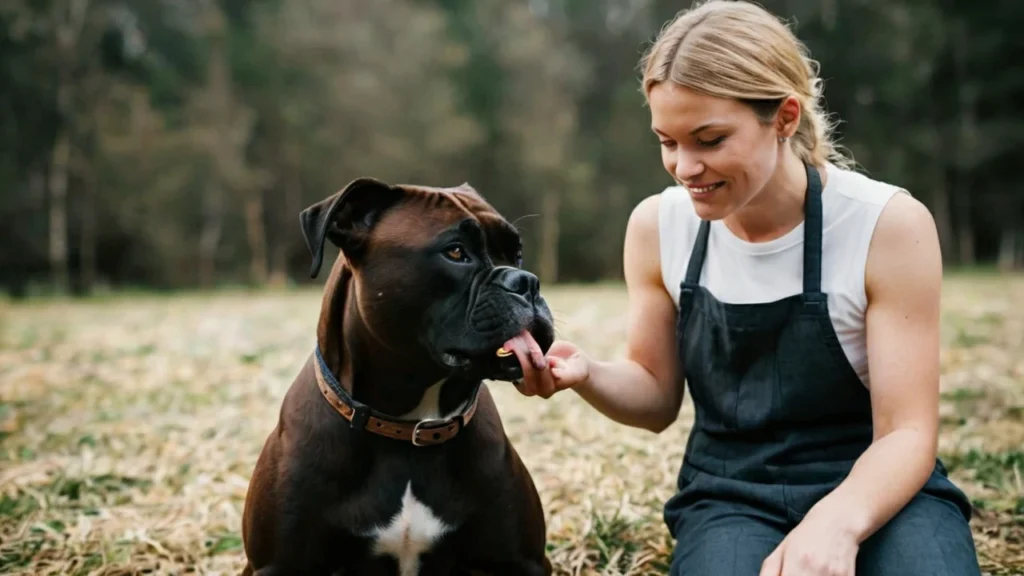
Premium dog food made for big breeds, heavy in proteins and healthy fats, is the greatest diet for a Boxer. Steer clean of fillers like maize and wheat and look for dishes that list actual meat because the first component. For their fitness, a balanced weight loss program that is suitable for their age and hobby stage is critical.
Types of Dog Food
Wet Food vs. Dry Food: What’s Best for Boxers?
Depending for your Boxer’s health requirements and preferences, you could pick between moist and dry meals. yet both may support tooth health. Combining the two may provide the advantages of each.
Dry Kibble vs Wet Canned
- Dry kibble is preferable to wet canned food for many Boxers, although wet kibble helps keep teeth, gums, and jaw strength intact.
- The crunch of a firm kibble can help eliminate plaque to some degree, but you will still need to offer some at-home dental care. Furthermore, it seems that eating dry food keeps the stools firmer and healthier.
- Try adding a little amount of canned food (be sure to use the same brand) or a small amount of water or low-sodium chicken or beef broth if your Boxer is a picky eater and doesn’t like dry food.
Commercial Vs Homemade
- Thinking about buying dog food from a store? It’s practical and guarantees your Boxer receives all the essential nutrients. However, cooking at home gives you complete control and may satisfy fussy eaters. Each has benefits and drawbacks.
- Choosing premium kibble or fresh ingredients for handmade meals is not an inexpensive option. It’s quality that counts. Costs for home-cooked meals may be reduced by buying in bulk and using frozen food.
- To fulfill nutritional requirements, handmade meals need regular supplements. For the sake of your Boxer’s health, make sure his food is balanced by include grains, vegetables, fruits, and proteins.
When Is It Time to Feed My Black Boxer Dog
- For most dogs, two meals a day is the ideal quantity of food to be served every day. Breakfast should be your dog’s first meal of the day, preferably after some morning exercise and a toilet break. This may include giving your dog a meal after their fast lap of the backyard or morning stroll.
- You should feed your dog his second meal around suppertime, this time after an exercise session. Give your dog their food at least two hours before their scheduled bedtime. This gives your dog plenty of time before bed to finish off any residual energy, relieve themselves, and digest their food.
- The best method to make sure that the dietary and behavioral demands of the majority of dogs are satisfied is to follow a regular feeding plan. A feeding plan establishes a consistent pattern that your dog will soon get used to, which will facilitate house and obedience training.
- Additionally, a routine might help your dog behave better during mealtimes. Frequent feeding intervals may deter aggressive eating behaviors like as bin raiding and begging. It also implies that you are able to see how they eat. Having a feeding schedule can help you better monitor your dog’s food intake since bloating after eating may be harmful for dogs.
Boxer Feeding Chart
| Breed | Feed Amount Per Day | AVG Price Per Day |
| Boxer (27KG – 32KG) | 540g – 640g | £2.32 – £2.75 |
Foods to Avoid or Restrict
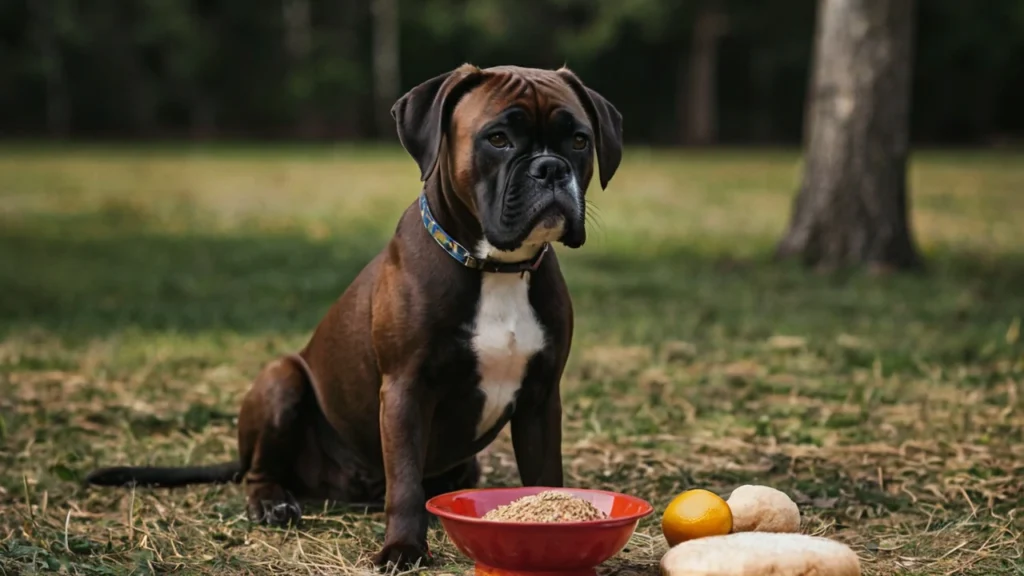
There are a few noteworthy exceptions to the general rule that meals acceptable for humans are likewise safe for dogs. The following foods are not recommended for your dog to eat:
- Onions: They have the potential to induce anemia. The health of your dog is at danger due to the dose-dependent response that will intensify with time.
- Raisins and grapes: Although they are good for humans, some dogs may get renal failure from them for unclear reasons It is really helpful to keep them out of the manner.
- Macadamia Nuts: Dogs can’t tolerate even extremely modest doses of macadamia nuts. Steer clear of sharing these treats with your pet.
- Raw Salmon, Trout, and Related Fish: Pacific Northwest anadromous fish may additionally have a parasite which could provide puppies salmon poisoning. By properly cooking the fish, the parasite could be destroyed, making sure that they’re secure to consume. With raw arrangements, but, proceed with warning.
- Chocolate and caffeine: Dogs are toxic to the theobromine located in those substances. Products containing chocolate and caffeine have to be stored away from your canine.
- Xylitol: A evidently happening sweetener used in numerous consumer goods including children’s vitamins, mints, and sugar-loose gum. Additionally, certain pet water additives include it. Canines may be harmed by even minute quantities.
- Alcohol: It should go without saying that alcohol poisoning occurs in dogs. Store alcohol out of reach to avoid any unintentional consumption.
You can maintain the protection and well-being of your black Boxer via being mindful of these foods and tablets. Always get advice out of your veterinarian within the event which you think your canine may have fed on some thing poisonous.
Special Dietary Considerations
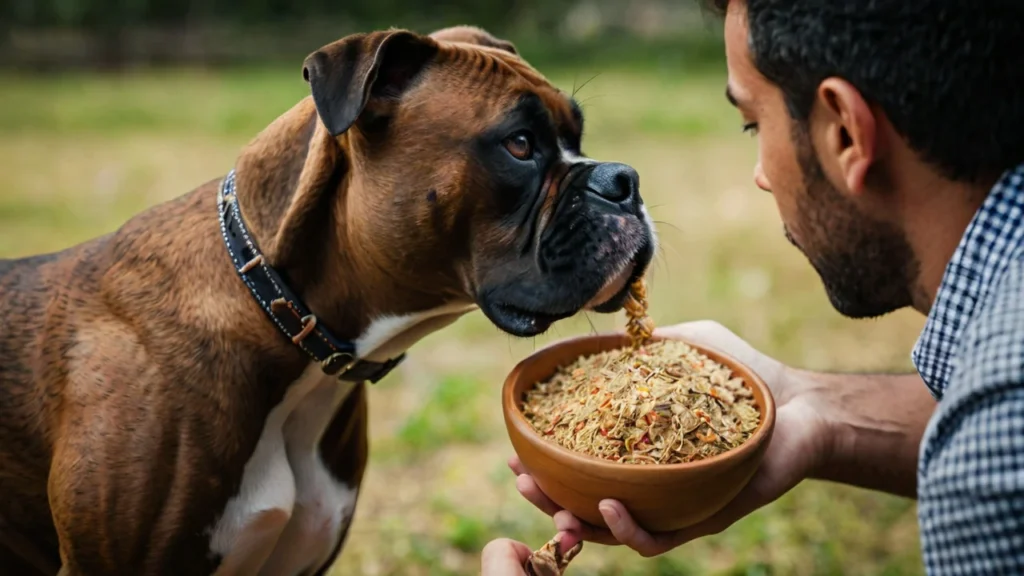
Please write 43 lines about a black boxer dog in the blog title that is provided below, being careful to use proper English. Please make the following stuff interesting and in order so that readers may benefit from it. Don’t alter anything.
Nutritional requirements of Black boxer Dog
Proteins and Amino Acids
- Proteins are significant in a black Boxer’s diet since they are essential for life and comprise 10 particular amino acids that are important for their health.
- These amino acids provide the carbon chains required for the synthesis of energy and function as the building blocks for proteins and other important substances.
- The well-being of your Boxer may be guaranteed by optimal protein sources, which provide a balanced variety of these vital amino acids.
- Although dogs have an innate attraction to diets high in protein, the specifics of this inclination are yet unknown. However, it is well known that dogs that get enough protein and vitamin D supplements may survive on a vegetarian diet.
Fats and Fatty Acids
- Dietary fats, which come from animal fats and other plant oils, provide concentrated energy and necessary fatty acids that are vital to the health of a black Boxer.
- They improve the flavor and texture of their food, aid in the absorption of fat-soluble vitamins, and support cell structure and function.
- Insufficiencies in essential fatty acids may result in skin lesions and increased vulnerability to infections, making them essential for the maintenance of healthy skin and coat.
- In Boxers, omega-3 and omega-6 fatty acids are essential for learning, eyesight, and general physiological health.
Enhancing Your Dog’s Diet
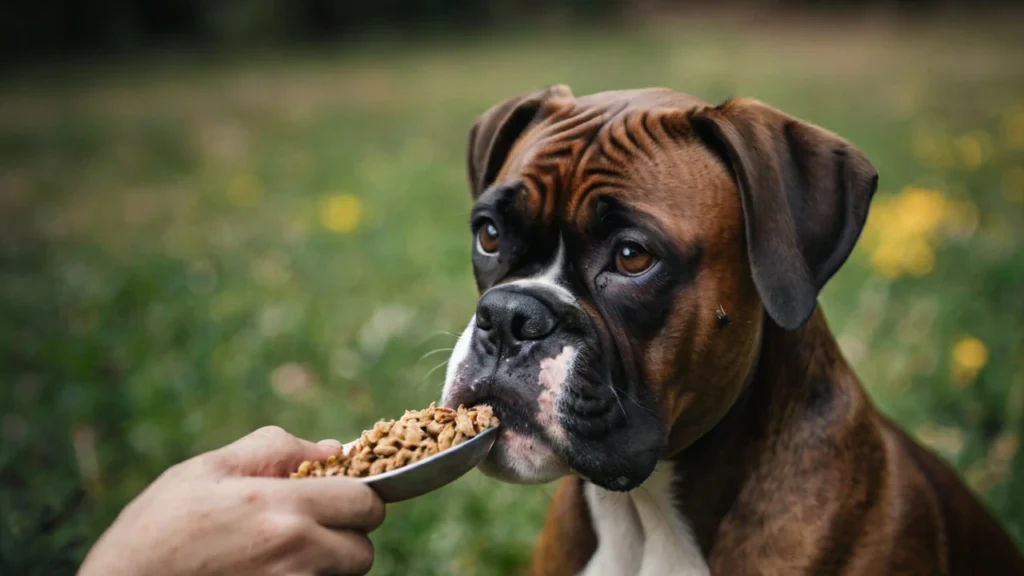
Supplementing Your Dog’s Diet
- Making the switch to a premium, natural raw food diet is critical for your dog’s health. Whether you cook at home or use Pro Dog’s food packages, dogs’ natural diets should include meat, organs, bones, and sometimes greenery. But why add-ons?
- Supplementing your dog’s diet improves their nutrition, meeting their specific demands at each stage of life and offering proactive protection against ailments specific to Boxers.
- You can make sure your loyal companion gets the best nutrition possible for growth by choosing natural, whole food supplements, like those in Pro Dog’s line, which are devoid of artificial ingredients and chemicals.
- Although certain health issues may be more common in particular breeds, their severity may be lessened by eating a balanced diet full of vital vitamins and minerals.
- With Pro Dog’s all-natural supplements, you can easily supplement your dog’s diet and meet their nutritional requirements for maximum health and enjoyment.
How to add supplements to raw dog food
- Regarding the ideal supplements for your dog’s raw food diet, we get a lot of questions. Which organic pet vitamins are necessary for a well-rounded diet? Selecting whole food meal toppers of high quality is crucial.
- This week, we’re going over our top four picks for raw food supplements for dogs and cats, emphasizing their advantages as the perfect complement to a raw food diet that is really balanced.
- Every pet is distinct and has various dietary demands, just like people. Even with balanced meals, they may customize their diet to perfection with a little more help.
- Adding raw food to your black Boxer’s diet may give them the additional boost they need to maintain their unique health and vigor, whether they are energetic young dogs or wise old seniors.
Importance of Regular Exercise
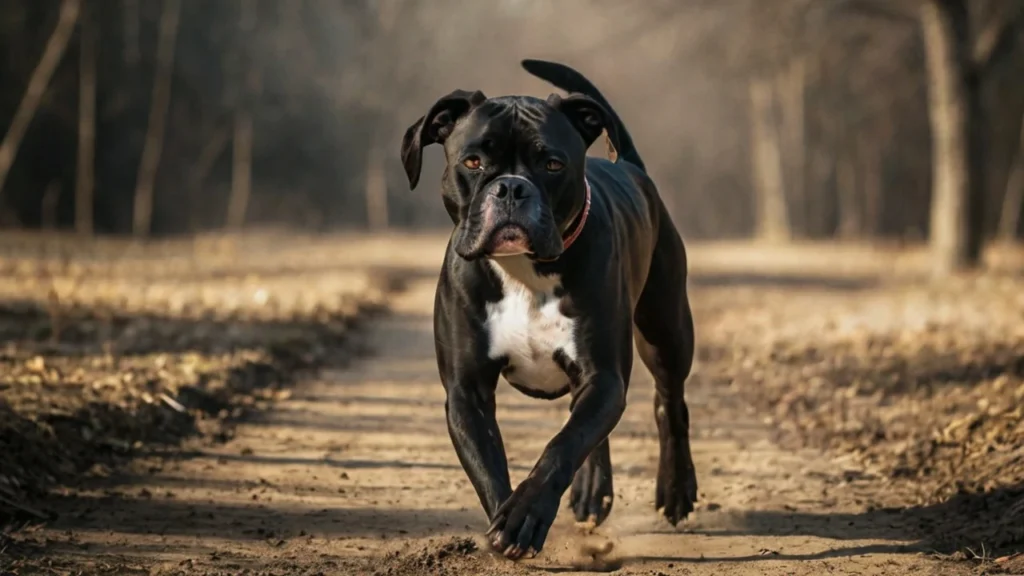
How to Exercise With Your Dog
Adopting a pet dog means pledging to provide it with the best life possible. Making ensuring kids get enough exercise and activity each day is part of this. Exercise regimens that are consistent not only maintain your black Boxer physically fit but also improve the relationship between you and your devoted friend.
Tips for Choosing the Right Activity for Your Dog
- Think about your dog’s age and fitness level while deciding on an exercise regimen. Walking is a low-effect exercise that an elderly canine should gain from.
- Even although a younger pup can be greater active, you should still watch them intently to make certain they do not get harm whilst playing.
- Walking or strolling, playing fetch for your backyard, swimming in your pool or a neighboring lake, or placing out on the dog park are some possible activities.
- Keep in mind that training your dog involves more than simply physical exertion. Additionally, you’re spending time together and strengthening your friendship.
Prioritize your dog’s fitness
- Particularly if you have a full-time job outside of your house. There is a limit to time, but quantity is not as vital as quality.
- Make a conscious effort to set aside time for your pet, even if it’s just for a quick stroll of ten to fifteen minutes.
- Recall that venturing outdoors for a short while is preferable than abandoning the activity entirely owing to time constraints.
Incorporate toys
- To add some excitement to your pet’s workout regimen, provide toys. Even if they don’t return the toys, you may still play fetch with them or let them run around with them.
- Keep in mind that not every toy is created equal in your dog’s eyes, so make sure you have a selection at home.
- Select toys according to your dog’s age and activity level; for younger or older dogs, go for softer alternatives; for energetic dogs, go for more demanding toys.
- Tennis balls, noisy toys, soft discs, rope toys, plush toys, and toys with hollow interiors that hold treats—like peanut butter dispensers—are a few of the well-liked options.
Energy Needs
- For them to power their everyday activity, dogs need a certain amount of energy, and their demands are increased by development, pregnancy, breastfeeding, and exercise.
- Calorie-wise, energy is derived mostly from lipids, proteins, and carbs. Even though cereals and legumes are common sources of carbs in commercial dog diets, digested and absorbed carbohydrates provide immediate energy.
- Certain starches and fibers that ferment may help control blood sugar levels and strengthen the immune system. Non-fermentable fibers, including wheat bran and cellulose, are helpful for controlling weight but provide little energy.
Underweight Or Overweight?
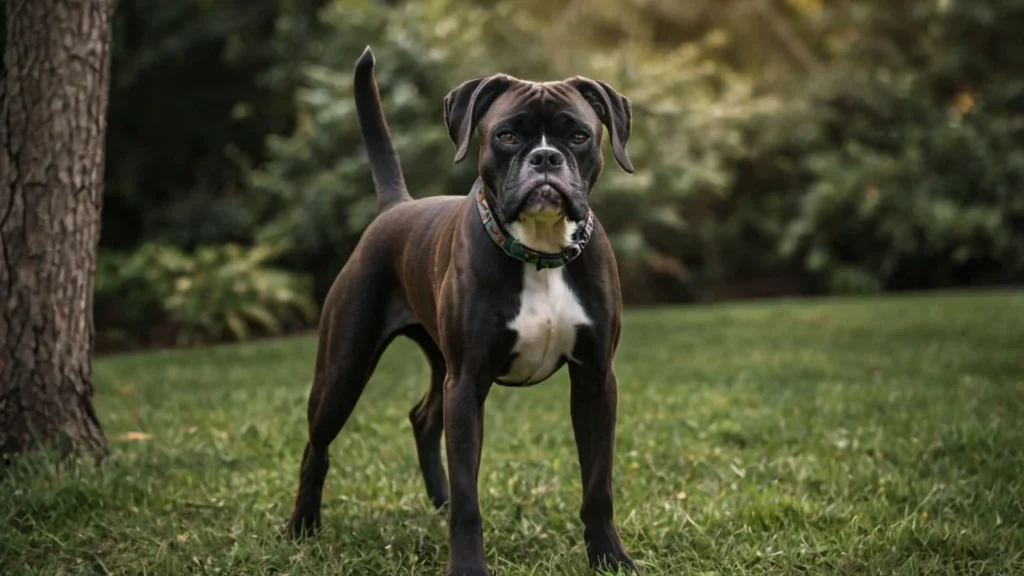
Underweight
- If your dog has little fat covering its ribs, vertebrae, or pelvic bones and you can readily see them, it may be underweight and may even be losing muscular mass.
- Prolonged underfeeding may cause a number of health problems, including as reduced development of pups, increased susceptibility to illnesses, and diminished capacity to nurse young. Furthermore, if an adult dog is underfed over time, osteoporosis may develop.
Ideal
If you can feel your black Boxer’s ribs readily, it’s at the perfect weight. There should be a discernible waist behind the ribs when seen from above. When seen from the side, your pet should also have a noticeable stomach tuck, which indicates that they weigh a healthy amount.
Overweight
- If you find it difficult to feel your black Boxer’s ribs, see fat deposits over its back and at the base of its tail, and when you look at it from above, you don’t see any waist behind the ribs, your dog may be overweight.
- Furthermore, a lack of tucked in stomach area in profile may be a sign of obesity. In western nations, obesity affects one in four dogs. Diabetes and osteoarthritis are among the dangers associated with obesity, especially in older and neutered dogs.
Conclusion
- It is vital for the fitness and wellbeing of your black Boxer canine to understand and deal with their specific dietary requirements.
- You can ensure your puppy has an extended, happy, and wholesome life by emphasizing top notch proteins, healthful fat, and balanced carbs. You also can take vitamins as required and interact in normal workout.
FAQs About Black boxer Dog Nutrition
Are Boxer dogs in good health?
Dilated cardiomyopathy, or DCM, is a potentially deadly cardiac circumstance that mostly influences boxers. It reasons the heart to develop, grow to be much less masculine, and lose its capability to pump blood to the body.
Can Boxers be hurt by eggs?
It is thus no longer a desire for individuals who locate it uncomfortable to have eggs go with the flow down their throats, but it is nevertheless an choice in case you’re feeling truely daring and need to take all of the nutrients out of your eggs. In my opinion, eggs are an less expensive, very nutritious, excessive-protein superfood that every fighter ought to be ingesting.
When does a boxer dog become poisoned?
Onions, garlic, and chives contain a poison that is safe for humans but may kill your boxer dog. This poison damages a dog’s blood cells, causing anemia and eventually death. Fever, vomiting, tachycardia, seizures, and muscle weakness are possible side effects of macadamia nuts. This poison damages a dog’s blood cells, causing anemia and eventually death. Fever, vomiting, tachycardia, convulsions, and muscle weak spot are possible side effects of macadamia nuts.
Which ailment most often affects Boxer dogs?
Unfortunately, brain tumors are responsible for the majority of cases of cancer, which is the most common health issue in this breed and over 40% of all causes of death in Boxers (UK Kennel Club).
